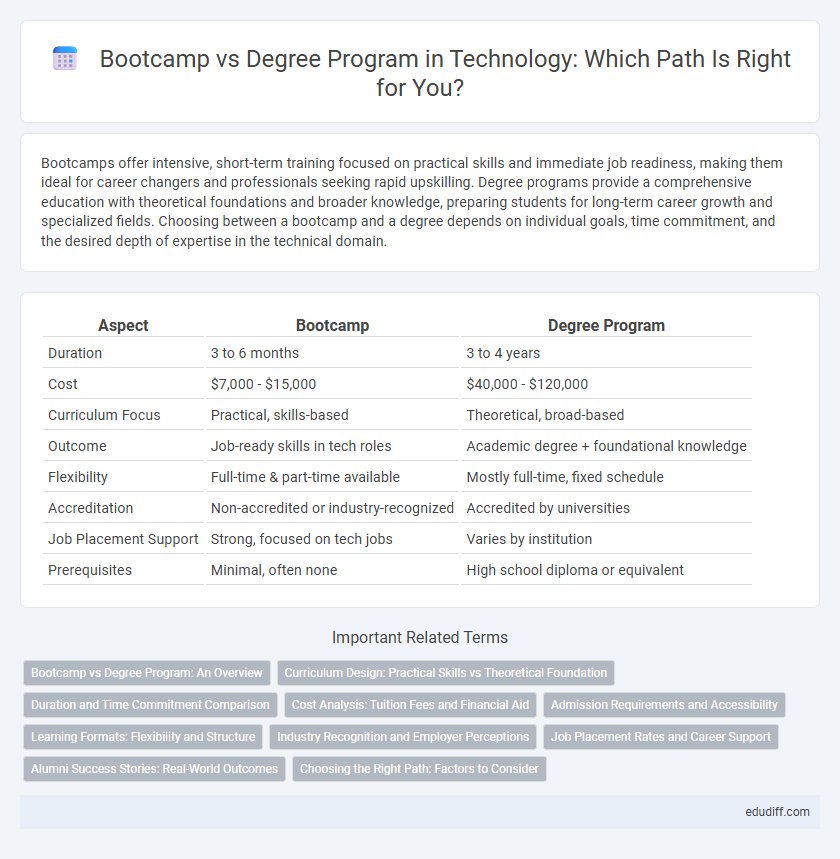Bootcamps offer intensive, short-term training focused on practical skills and immediate job readiness, making them ideal for career changers and professionals seeking rapid upskilling. Degree programs provide a comprehensive education with theoretical foundations and broader knowledge, preparing students for long-term career growth and specialized fields. Choosing between a bootcamp and a degree depends on individual goals, time commitment, and the desired depth of expertise in the technical domain.
Table of Comparison
| Aspect | Bootcamp | Degree Program |
|---|---|---|
| Duration | 3 to 6 months | 3 to 4 years |
| Cost | $7,000 - $15,000 | $40,000 - $120,000 |
| Curriculum Focus | Practical, skills-based | Theoretical, broad-based |
| Outcome | Job-ready skills in tech roles | Academic degree + foundational knowledge |
| Flexibility | Full-time & part-time available | Mostly full-time, fixed schedule |
| Accreditation | Non-accredited or industry-recognized | Accredited by universities |
| Job Placement Support | Strong, focused on tech jobs | Varies by institution |
| Prerequisites | Minimal, often none | High school diploma or equivalent |
Bootcamp vs Degree Program: An Overview
Bootcamps offer intensive, short-term training focused on hands-on skills and practical experience, ideal for tech professionals seeking rapid career transitions. Degree programs provide comprehensive theoretical knowledge and broader academic foundations over several years, emphasizing critical thinking and research skills. Employers often value bootcamp graduates for job-ready capabilities, while degree holders benefit from formal credentials and long-term career flexibility.
Curriculum Design: Practical Skills vs Theoretical Foundation
Bootcamp curriculum design emphasizes hands-on projects and real-world applications to rapidly develop practical skills demanded by the tech industry. Degree programs focus on a comprehensive theoretical foundation, covering core computer science principles and advanced concepts over several years. This structured approach builds deep analytical abilities and prepares learners for complex problem-solving beyond immediate job requirements.
Duration and Time Commitment Comparison
Bootcamp programs typically range from 8 to 24 weeks of intensive, full-time study, requiring 40-60 hours per week, whereas degree programs usually span 2 to 4 years with part-time or full-time commitments averaging 15-20 hours of coursework weekly. Bootcamps emphasize rapid skill acquisition in technical fields like coding or data science, facilitating quicker entry into the workforce. Degree programs involve comprehensive theoretical and practical education, demanding sustained time investment for thorough subject mastery and broader academic development.
Cost Analysis: Tuition Fees and Financial Aid
Bootcamp tuition fees typically range from $7,000 to $15,000, offering a cost-effective alternative to traditional degree programs, which average $40,000 to $100,000 for a four-year degree. Financial aid options for bootcamps include scholarships, income share agreements, and employer sponsorships, whereas degree programs primarily rely on federal loans, grants, and institutional scholarships. Evaluating return on investment highlights bootcamps' shorter duration and focused curriculum can lead to faster employment, reducing overall education expenses compared to the higher upfront and time costs of degree programs.
Admission Requirements and Accessibility
Bootcamp programs typically offer more accessible admission requirements, often requiring minimal prerequisites such as a high school diploma or basic coding knowledge, making them ideal for career changers and self-taught learners. Degree programs demand stringent criteria including standardized test scores, formal transcripts, and sometimes prerequisite courses, which can extend the timeline and limit accessibility for non-traditional students. The accelerated nature and inclusive entry standards of bootcamps provide flexible pathways to technical skill acquisition compared to the structured, comprehensive curriculum of degree programs.
Learning Formats: Flexibility and Structure
Bootcamp learning formats prioritize flexibility with intensive, short-term schedules designed for rapid skill acquisition, often suitable for working professionals seeking immediate career shifts. Degree programs offer structured, long-term curricula with comprehensive theoretical foundations and paced learning, fitting students who prefer in-depth study and academic credentials. The choice between bootcamp and degree hinges on balancing the need for flexible, outcome-driven training against the value of systematic education and formal qualifications.
Industry Recognition and Employer Perceptions
Bootcamps offer intensive, skills-focused training highly valued for practical competency in technology roles, often leading to faster employment compared to traditional degree programs. Degree programs provide comprehensive theoretical foundations and critical thinking skills that many employers recognize for advanced roles and leadership positions. Employers increasingly value bootcamps for their up-to-date curriculum and hands-on experience but often consider degrees essential for roles demanding formal education and broad discipline knowledge.
Job Placement Rates and Career Support
Bootcamps deliver intensive, project-based training designed for rapid skill acquisition, often resulting in job placement rates as high as 70-85% within six months post-completion. Degree programs offer comprehensive theoretical knowledge and tend to have longer recruitment pipelines but benefit from established alumni networks and university career services that support sustained career growth. Employers increasingly value bootcamp graduates for their practical skills in tech roles, while degree holders benefit from broader academic recognition and diverse career pathways.
Alumni Success Stories: Real-World Outcomes
Bootcamp alumni frequently secure high-impact roles at leading tech companies such as Google, Amazon, and Microsoft within six months of graduation, demonstrating rapid career advancement and skill application. Degree program graduates often benefit from comprehensive theoretical knowledge paired with internship experiences, leading to diverse opportunities in research-intensive and leadership positions. Both pathways showcase significant employer recognition and robust career trajectories, with bootcamps excelling in accelerated job placement and degrees offering long-term professional development.
Choosing the Right Path: Factors to Consider
When choosing between a bootcamp and a degree program, evaluate factors such as time commitment, cost, and career goals. Bootcamps offer intensive, short-term training focused on practical skills like coding or data analysis, suitable for rapid entry into the tech industry. Degree programs provide comprehensive theoretical knowledge and recognized credentials, often preferred for roles requiring deeper expertise or research opportunities.
Bootcamp vs Degree Program Infographic

 edudiff.com
edudiff.com